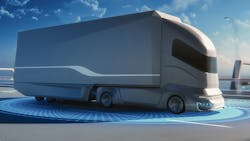Fleet Advantage program designed to offer ‘easy’ EV path
HANNOVER, Germany—Fleet Advantage launched EV Path, “a practical way” to support heavy-duty fleets’ transition to electric vehicles and alternative fuel trucks, the financing and fleet management specialist announced here at IAA Transportation 2024.
The concept is simple enough: Fleet Advantage customers—typically large private fleets—are looking to the company to help them meet corporate sustainability goals, to say nothing of looming clean truck adoption schedules, Brian Antonellis, Fleet Advantage senior vice president, fleet operations, explained to FleetOwner.
“It’s a little scary what’s happening right now. How do we embrace it, and how do we help people manage change? The intent is, let’s make it easy,” Antonellis said. “These fleets order hundreds and hundreds of trucks every year. So for every 100 trucks you order, we’re going to give you an EV at the exact same price. If your diesel tractors are $150,000 your EV will be $150,000.
“You want to transition; you want to learn. Our flexibility and our lease gives you the ability to move out of diesel into electric at any time.”
The adoption of EV trucks has been closely watched on a global scale, and nearly half of fleet respondents to a recent IAA Conference survey (49%) said they believe Europe is ahead of the U.S. in heavy-duty truck transportation and logistics, with 26% citing zero-emission tractors as the main reason.
In the U.S., there are a number of barriers to adoption, Antonellis pointed out. Fleet Advantage aims to remove these hurdles by taking care of subsidies and making the ordering process as smooth as possible. Additionally, Fleet Advantage has had 30-40 EVs on the road for a couple of years, providing a valuable learning experience, which is shared with customers.
Fleet Advantage calculates the monthly lease payment match could represent savings to the fleet of up to $3,000 per truck, per month, in addition to off-loading the bulk of the equipment’s residual risk.
See also: Fleet Advantage offers unbundled lease comparative index
So how will Fleet Advantage manage that risk themselves? Basically, as an equipment leasing company, the risk of the early unknowns is nothing compared to the risk of falling behind in the transition.
“Here’s the way we’re viewing it: Right now, we have 24,000 diesel assets on the road. We know that that’s going to transition,” Antonellis said. “Diesel trucks might be only 60 or 70% of the market in seven years. So we’re taking a targeted risk. We’re blending EV purchases where we’re holding some of the risk with traditional diesel purchases, which have traditionally been a good revenue stream for us. And as we blend that, we can limit the risk.”
The majority of fleets today are still taking a calculated and measured approach to the EV truck acquisition strategies as they continue to look at the buildout of their alternative fuel infrastructure, such as charging stations and maintenance operations.
While the companies remain responsible for the buildout of their infrastructure needs in procuring and utilizing electric trucks, Fleet Advantage is planning a rollout later this year of an extension of its fleet services offerings where it will introduce additional consultative services to help fleet clients with a suite of solutions to maximize the acquisition, utilization, maintenance, and surrender of EV and alternative fuel truck leases.
In an industry benchmark survey conducted in February 2023, 65% of respondents said they were most interested in electric trucks, while 15% cited hydrogen and 25% CNG. Forty-five percent of the respondents also noted that the time frame to deploy alternative fuel trucks would be 5-10 years. This past year in a follow-up survey, it was noted that those numbers were shifting, with 33.3% indicating EV over the next 5-7 years (29.6% saying another 10 years), and 38.5% indicating hydrogen. This timetable for electric truck adoption continues to change, as three years ago the majority (54%) said they didn’t plan to deploy electric trucks for 5-10 years. Also of note: The most recent survey shows that roughly 25% of fleets still do not see the value in adopting electric or hydrogen trucks, respectively. All of this change reinforces the fact that fleets have unique timelines in how they wish to bridge over to alternative fuels.
“Adopting electric trucks is not just an environmental mandate but also a significant financial commitment,” said Brian Holland, president and CEO of Fleet Advantage. “Our innovative EV Path program is yet another pioneering initiative developed by our team, designed to bridge the gap between traditional diesel fuel vehicles and the future of alternative fuel-powered transportation. By offering flexible financing solutions with practicality in mind and fleet services support, we aim to empower fleets to make the transition smoothly and effectively.”
About the Author
Kevin Jones
Editor
Kevin has served as editor-in-chief of Trailer/Body Builders magazine since 2017—just the third editor in the magazine’s 60 years. He is also editorial director for Endeavor Business Media’s Commercial Vehicle group, which includes FleetOwner, Bulk Transporter, Refrigerated Transporter, American Trucker, and Fleet Maintenance magazines and websites.
Working from Beaufort, S.C., Kevin has covered trucking and manufacturing for nearly 20 years. His writing and commentary about the trucking industry and, previously, business and government, has been recognized with numerous state, regional, and national journalism awards.

